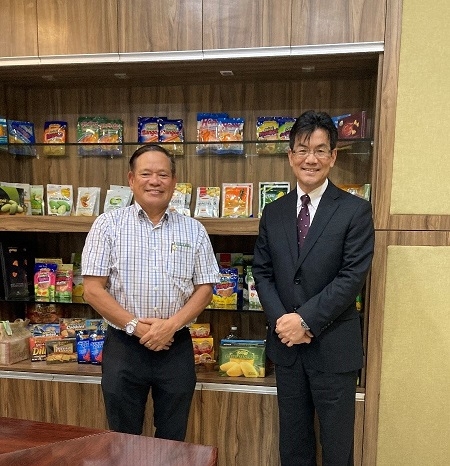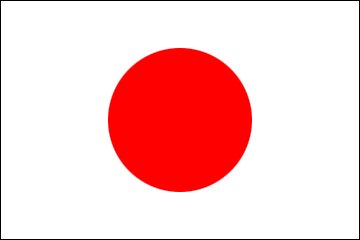Letter from Cebu (10) ”A Success Story of the Mango Business”
2022/10/19
Letter from Cebu (No.10)
“A Success Story of the Mango Business”
“A Success Story of the Mango Business”
There is a Cebuano businessman called “the Mango King”. His name is Justin Uy, the Founder and CEO of the largest dried fruits processing and exporting company in the Philippines, Profood International Corporation. He is also the Chairman and President of J-Park Island Resort & Waterpark, as well as the owner of J Center Mall.
How did he become successful in the Mango business? He was born in Cebu in 1958, as the 4th of 11 siblings. His father was a cigarette distributor, and at the age of 12, he started working for his father. Since 15 years old, he engaged into a fashion jewelry business, chicken egg-laying, mushroom-growing and other small-time ventures, but none of them lasted long mainly due to the shortage of the capital. In 1978, when he was 19 years old, he started a dried mango processing business. He noticed that mangoes were so abundant during the harvest season (March to May), but farmers were not harvesting because no one would buy them. He started to make dried mangoes with only seven workers. This is the beginning of the Profood International.
His dried mango processing business faced challenges from the earlier stage. Seven other companies were engaged in the same business since the 1950s, and expanding its sales in the domestic market in the Philippines was difficult. So, he tried to export dried mangoes overseas, starting from Hong Kong.
According to Mr. Justin Uy, there were two turning points for expanding his business, in 1986, and in 1993. In 1986, he was invited by the Japan External Trade Organization (JETRO) to Japan for two weeks to look at the production facilities and distribution systems. He learned that high quality products are indispensable for penetrating the Japanese market. The same year, he was invited by the Dutch Government to Rotterdam, the Netherlands for one month, to do research about the European market.
In 1993, he successfully obtained a loan of $2 million from the Technology and Livelihood Resource Center (TLRC). He purchased machinery for modernizing his factories. That was a necessary requirement for applying for an international certificate. Incidentally, the sub-loans of the TLRC were funded by the Japanese Government as a form of 400 million yen loan of Japan International Cooperation Agency (JICA) Agro-industry Technology Transfer Project. Under the project, 114 sub-loans were implemented for prawn production, fruit and vegetable cultivation, livestock, feeds, and fiber etc.
Now, the company is manufacturing products from 15 tropical fruits. It produces three million pieces of dried mango a day, and is exporting to over 50 countries. It hires 6,000 workers in Cebu during the harvest season, and several hundred workers for factories in Manila and Davao. Producing the company’s own brand accounts for 65% of the whole production, while 25% of the production are “industrial”; being sold to other companies in a form of mango, banana, pineapple, calamansi & other fruit purees and processed fruit products, and “toll packing”, producing products under other companies’ brands, accounts for 10%.
Mr. Justin Uy says that the Cebuano workers are generally cooperative, and there are less labor disputes than other regions. He also says that Cebu is located at the center of the Philippines, making it convenient for collecting best fruits and other materials from various parts of the country. The geological position of Cebu and the good labor quality may have contributed to his business success.
Several other factors seem to have positively affected his business success. He aimed at overseas markets rather than domestic markets from an earlier stage. He realized the importance of quality control of the products for penetrating overseas markets. He also obtained a loan to purchase machines for modernizing his factories.
But, I think it was his dedication and hard work that have made his business successful. He said he has been working for 18 hours every day for the first 18 years of his business without even taking a day off. His invitation to Japan and Europe, and the TLRC loan were not a matter of luck. He applied many invitation programs and made loan proposals many times without giving up. Such tenacious efforts and devotion to his work seem to have made him “the Mango King”.
How did he become successful in the Mango business? He was born in Cebu in 1958, as the 4th of 11 siblings. His father was a cigarette distributor, and at the age of 12, he started working for his father. Since 15 years old, he engaged into a fashion jewelry business, chicken egg-laying, mushroom-growing and other small-time ventures, but none of them lasted long mainly due to the shortage of the capital. In 1978, when he was 19 years old, he started a dried mango processing business. He noticed that mangoes were so abundant during the harvest season (March to May), but farmers were not harvesting because no one would buy them. He started to make dried mangoes with only seven workers. This is the beginning of the Profood International.
His dried mango processing business faced challenges from the earlier stage. Seven other companies were engaged in the same business since the 1950s, and expanding its sales in the domestic market in the Philippines was difficult. So, he tried to export dried mangoes overseas, starting from Hong Kong.
According to Mr. Justin Uy, there were two turning points for expanding his business, in 1986, and in 1993. In 1986, he was invited by the Japan External Trade Organization (JETRO) to Japan for two weeks to look at the production facilities and distribution systems. He learned that high quality products are indispensable for penetrating the Japanese market. The same year, he was invited by the Dutch Government to Rotterdam, the Netherlands for one month, to do research about the European market.
In 1993, he successfully obtained a loan of $2 million from the Technology and Livelihood Resource Center (TLRC). He purchased machinery for modernizing his factories. That was a necessary requirement for applying for an international certificate. Incidentally, the sub-loans of the TLRC were funded by the Japanese Government as a form of 400 million yen loan of Japan International Cooperation Agency (JICA) Agro-industry Technology Transfer Project. Under the project, 114 sub-loans were implemented for prawn production, fruit and vegetable cultivation, livestock, feeds, and fiber etc.
Now, the company is manufacturing products from 15 tropical fruits. It produces three million pieces of dried mango a day, and is exporting to over 50 countries. It hires 6,000 workers in Cebu during the harvest season, and several hundred workers for factories in Manila and Davao. Producing the company’s own brand accounts for 65% of the whole production, while 25% of the production are “industrial”; being sold to other companies in a form of mango, banana, pineapple, calamansi & other fruit purees and processed fruit products, and “toll packing”, producing products under other companies’ brands, accounts for 10%.
Mr. Justin Uy says that the Cebuano workers are generally cooperative, and there are less labor disputes than other regions. He also says that Cebu is located at the center of the Philippines, making it convenient for collecting best fruits and other materials from various parts of the country. The geological position of Cebu and the good labor quality may have contributed to his business success.
Several other factors seem to have positively affected his business success. He aimed at overseas markets rather than domestic markets from an earlier stage. He realized the importance of quality control of the products for penetrating overseas markets. He also obtained a loan to purchase machines for modernizing his factories.
But, I think it was his dedication and hard work that have made his business successful. He said he has been working for 18 hours every day for the first 18 years of his business without even taking a day off. His invitation to Japan and Europe, and the TLRC loan were not a matter of luck. He applied many invitation programs and made loan proposals many times without giving up. Such tenacious efforts and devotion to his work seem to have made him “the Mango King”.
(Mr. Justin Uy at his office in Profood International)

Hideki YAMAJI
Consul General of Japan in Cebu
Consul General of Japan in Cebu
(end)
